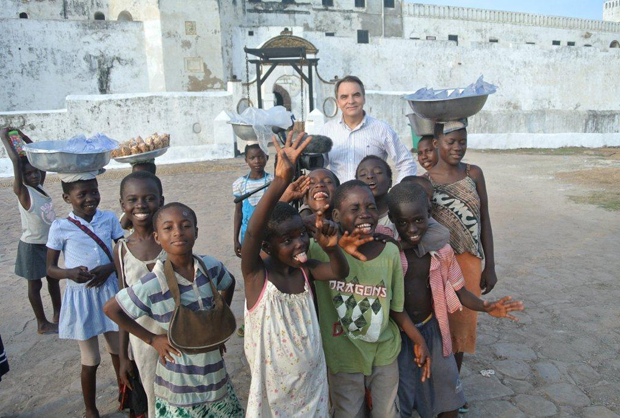Sean O’Shea is a reporter with Global TV in Toronto. In the summer of 2012, he reported from Ghana and served as an expert trainer with Journalists for Human Rights (JHR) in Ghana as part of the Shaw Africa Project. He was assigned to work with the English-language station Viasat1.

When I got to Ghana in early July, the country’s election campaign was in full swing. Billboards bore the faces of the flag-bearers for the various political parties. Radio and television talk shows were filled with debate about which leaders could best serve the country. The country’s 100-plus newspapers were chock full of news and commentary on the race. From an editorial point of view, newspapers typically support one party and do their best to lambaste the rest.
In contrast, one day I went to a press conference announcing how private broadcasters would respect a voluntary Code of Conduct for covering the presidential and parliamentary campaigns. This genteel event was punctuated by opening and closing prayers, entertainment by an African dance troupe, the agenda filled with a succession of speakers (including the Roman Catholic Archbishop) calling on the broadcast media to tread fairly in the run-up to the country’s vote, still five months away.

- ‘Alarming trend’ of more international students claiming asylum: minister
- Canadian government’s satellite deal has Tories calling for Elon Musk involvement
- Justin Trudeau headed to UN Summit of the Future amid international instability
- Activists call for Boogie the monkey to be removed from Ontario roadside zoo
Sipping a soft drink in the lobby of the conference centre after the event (Guinness Malta was a favourite choice of many of the journalists) it struck me that covering an election in Ghana is the stuff of those with plenty of stamina. Here we were, in the midst of the election on a hot July day, and the country’s electorate would not go to the polls until an equally warm or even hotter day on December 7.

Get daily National news
Ghanaians love to talk politics. Or listen to those talking politics. Everyone has an opinion. Correction: several opinions. Unlike in Canada, where many voters are loathe to express their viewpoint to strangers about how they’ll vote, people in Ghana don’t share those reservations.
Ghana is a poor country, but much better off than many nations in west Africa. There are mineral resources like oil, gold and iron. The country is also one of the world’s largest producers of cocoa. Unlike its neighbours – Ivory Coast and Mali, Ghana hasn’t been recently battered by civil war.
Considering its riches, Ghana’s citizens should enjoy a better standard of living than they do. But instead, tens of thousands who live in Accra, the capital, live in poor conditions. In a crowded urban environment, a lot have no indoor toilets even though landlords charge steep rents.
One of the stories we covered at Viasat1, the Swedish-owned television station where I was based, was about how the government had run out of money to distribute national identity cards. These photo ID cards would be useful to voters in the election.
But tens of thousands of printed cards were locked up in a government office and could only be claimed by those who would show up directly to claim them. Not practical for most Ghanaians who don’t own cars or live outside the capital city. Citizens could still vote without the cards, but could face more scrutiny at polling stations.
An election summer was an interesting time to visit and work in Ghana. Especially because of the events that happened on July 24. In mid-afternoon, as I was sitting enjoying a meal with a friend at the Melting Moments coffee shop, people in the restaurant began gathering around the flat-screen television on the wall. One of the television stations had broken into programming with bad news: the country’s president, John Evans Atta-Mills, was dead.
The president had been seeking his second term as Ghana’s leader. He had won the election four years earlier in a squeaker, with a margin of less than one per cent over Nana Akufo-Addo, who since served as head of the opposition party.
But for months, people knew their president was ill. Atta-Mills had travelled to the U.S. for treatment for throat cancer. He looked pale and frail as he recently boarded a flight. Now, three days after his 68th birthday, the president lay dead in a military hospital, having suffered a heart attack.
For a few hours, many in the capital wondered whether power would transfer peacefully, or if the military would intervene. This is the first time a sitting president had died. True to the constitution, a few hours later the country’s vice-president, John Dramani Mahama, was sworn into office on live television.






Comments